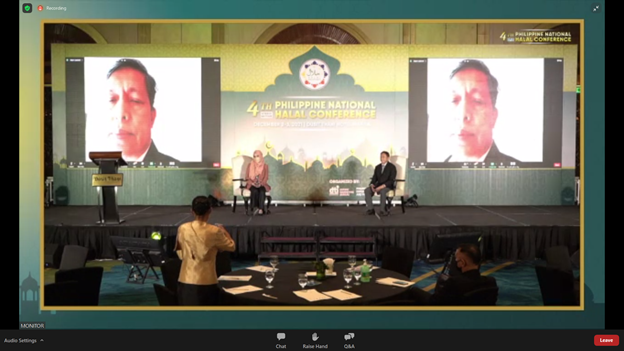
With the promulgation of the Republic Act No. 10817 known as the, “Philippine Halal Export Development and Promotion Act of 2016,” the Philippine Accreditation Bureau (PAB) is empowered to accredit Halal Certification Bodies (HCBs) in accordance with established policies and guidelines.
During the 4th Philippine National Halal Conference on Friday, 03 December 2021, Assistant Director Ernani M. Dionisio explained how accreditation strengthens the credibility of Philippine Halal through accreditation, and the role of the bureau as stipulated by the republic act.
Dir. Dionisio said that, “accreditation is the third party attestation related to a conformity assessment body conveying formal demonstration of its competence, impartiality, and consistent operation in performing specific conformity assessment activities.”
To be more specific, accreditation of halal certification body is a formal declaration that the HCB is competent to certify halal products or services. Thus, “it is a process of verifying their compliance to the criteria that they are applying for,” said Dir. Dionisio.
Upon the implementation of the Republic Act No. 10817, PAB had been working tirelessly to achieve initiatives like securing a membership status to the International Halal Accreditation Forum (IHAF) in 2017.
PAB plans to further apply for signatory membership to the IHAF Multi-Lateral Recognition Arrangement (MRA) in 2022. If it succeeds, PAB-accredited Halal Certification Bodies will be recognized by other IHAF MLA signatory members. PAB-accredited HCBs would not need to apply for registration or recognition from member countries where their certified products will be exported to.
IHAF is the world’s only regulating and unifying platform for Halal. Its membership is comprised of 38 accreditation and other bodies from over 35 countries in Africa, Asia, Australasia, Europe, and the Americas. Through its members, IHAF represents the Halal Industry around the world that serves a global Halal consumer market, consisting of more than 1.8 billion Muslims worldwide.
PAB has established a Memorandum of Understanding (MOU) with GCC Accreditation Center in 2017, and with Emirates Authority for Standards and Metrology (ESMA) in 2018. Apart from these, the bureau hopes to seal an MOU with the BPJPH or the Badan Penanggulangan Jaminan Produk Halal, Indonesia (Halal Product Assurance Organizing Agency) to ease halal trading to and from their economy.
The bureau has conducted several seminars for the Halal Certification Bodies on topics like Awareness to the ISO/IEC 17065 and Accreditation Guidelines to help them prepare for accreditation.

Dir. Dionisio emphasized that PAB, under the Republic Act No. 10817, is only mandated to accredited HCBs that certify products for export. Therefore, Halal Certification Bodies that only certify products intended for local or domestic market are not required to get accredited. However, choosing an accredited CB ensures the consumers that a CB is compliant with best practices and internationally-recognized standards.
”A certification body that is accredited by an accreditation body with signatory membership to the Asia Pacific Accreditation Cooperation (APAC), International Accreditation Forum (IAF), International Laboratory Accreditation Cooperation (ILAC) Multilateral/Mutual Recognition Arrangement (MLA/MRA), and internationally recognized by IHAF proves that it complies with best practices. It is competent to deliver a consistently reliable and impartial service that meets the appropriate, internationally-recognized standard,” added Dir. Dionisio.
Interested HCBs may get the full list of accreditation requirements through the PAB website’s “Resources” tab and by choosing “Certification Body Documents” and “Certification Body Accreditation Forms” or by sending an email to pab@dti.gov.ph.
Release Date: 10 December 2021.



